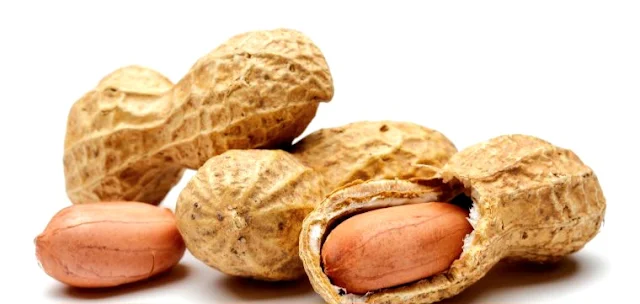In parts of Africa peanuts also known as Groundnuts, are commonly reffered to as man-power. Let's examine the origin of this nick name.
A cup of peanuts contains about 5g of arginine. Arginine is the amino acid precursor of Nitrous Oxide (NO), the chemical responsible for dilation of your ateries including penile and genital vessels in both women and men.
Peanuts , therefore help to improve circulation and increased blood flow around the bidy including the genital region. This effect is not instant but takes about 40 to 60 mins.
Among the other health benefits of eating peanuts are:
1) High in protein, healthy fats, fibre, vitamins (including B vitamins and vitamin E), and minerals (including magnesium, phosphorus, and potassium).
2) Heart Health: The monounsaturated and polyunsaturated fats found in peanuts can benefit heart health by lowering harmful cholesterol levels and decreasing the risk of heart disease.
3) Weight Management: Despite eating high in calories, peanuts' protein and fibre content might help regulate hunger, thus assisting in weight loss.
4) Antioxidants: Peanuts include antioxidants such as resveratrol and vitamin E, which can help protect cells from free radical damage.
5) Blood Sugar Control: The fibre and good fats in peanuts may aid in blood sugar stabilisation, lowering the risk of type 2 diabetes.
6) Nutrient Absorption: Peanuts include nutrients such as folate and vitamin E, which can help with nutrient absorption from other foods.
7) Skin Health: The vitamin E in peanuts may help to maintain healthy skin by protecting it from UV exposure and increasing skin suppleness.
8) Muscle Health: Peanuts' protein content can help with muscle repair and development, making them an excellent post-workout snack.
9) Energy Boost: Because to its combination of healthy fats, protein, and carbs, peanuts provide a concentrated supply of calories that provide sustained energy.
10) Bone Health: Peanuts include nutrients such as magnesium and phosphorus, which are necessary for strong and healthy bones.
11) Cognitive Function: Niacin (vitamin B3) found in peanuts supports cognitive function and may help minimise the risk of age-related cognitive decline.
12) Digestive Health: Peanuts include dietary fibre, which assists digestion, supports a healthy gut microbiota, and can help reduce constipation.
13) Decreased Risk Of Gallstones: Consuming peanuts on a regular basis has been linked to a decreased chance of developing gallstones, presumably because to the beneficial fats they contain.
14) Anti-inflammatory Properties: Peanuts include anti-inflammatory chemicals such as resveratrol and antioxidants, which may help lower the risk of chronic inflammation-related disorders.
15) Skin Protection: The monounsaturated fats included in peanuts can help preserve the lipid barrier of the skin, keeping it moisturised and lowering the risk of dryness and irritation.
16) Eye Health: Peanuts include vitamin E, which is good for the eyes and may help lessen the risk of age-related macular degeneration.
17) Stress Reduction: Peanuts include tryptophan, a helpful amino acid that can aid in the creation of serotonin, a neurotransmitter that helps regulate mood and relieve stress.
18) Immunological Support: Peanuts include zinc, a mineral essential for immunological function that can assist the body in fighting infections and disorders.
19) Blood Pressure Control: The potassium content of peanuts may help to regulate blood pressure and lower the risk of hypertension.
Eating peanuts every day may offer various possible advantages, but due to their high calorie and fat content, they should be consumed in moderation.
While peanuts have numerous health advantages, it's vital to watch your portion amounts, especially if you have allergies or are attempting to lose weight. A diversified and balanced diet rich in nutrients from many food sources is essential for general health.
Comment below, and share it with your friends. Thank you from the bottom of my heart!


Comments
Post a Comment
Please comment here 👆🏼